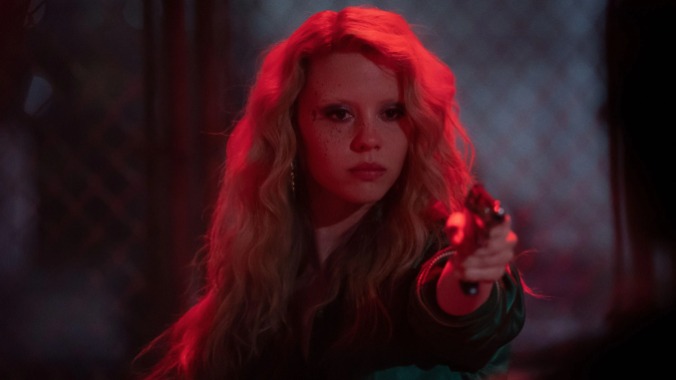Ambition and Repetition Stifle MaXXXine‘s Horror

Ti West is a filmmaker difficult to be objective about, or rather, definite in terms of “good” and “bad,” because I often find the ways in which his movies fail just as interesting as how they succeed. His films have become more interesting as films about horror rather than bodily experiences in and of themselves. Part of this is their increasing self-consciousness. X—which spawned the series of Mia Goth vehicles of which MaXXXine is the third (and possibly not final installment)—was a deconstruction of DIY filmmaking ethics not dissimilar to Silver Bullets, a mumblecore horror directed by Joe Swanberg and starring West, which concerned itself with filmmaking ethics, and subsequently (coincidentally) spawned its own trilogy of films chasing that same concern.
A suspicion I had about X and its prequel Pearl was confirmed by West during a live-streamed Q&A after an advanced screening: X gestated for some time, and Pearl was written and pitched very quickly while the cast & crew were on a two-week lockdown during their entrance to New Zealand during the height of COVID. X, to me, had always felt like the more dense, fleshed-out work, and Pearl the much smaller, looser and spontaneous piece. It seemed that the particulars of Pearl landed better with audiences than the self-examination of X, with the she’s-just-like-me antiheroine of Pearl spawning tons of Halloween costumes. It will be interesting to see if the love of that character will prove to have enough plasticity for people to embrace Pearl’s parallel Maxine in a similar fashion.
MaXXXine opens, like the preceding works, with a The Searchers-like frame-within-a-frame, this time with Goth’s heroine walking into a Hollywood soundstage for an audience. Maxine seems to think she has the stuff, that she’s a star waiting to be made, and Elizabeth Bender (Elizabeth Debicki), the director of the highly anticipated horror sequel The Puritan II, seems to think so as well. Maxine is getting her big shot to break out of the world of adult entertainment, whether that has meant making porno movies like the ill-fated events of X (dubbed the “Texas Porn Star Massacre” in newspaper headlines) or dancing in peep shows on Hollywood Boulevard. But all is not well in Maxine’s rise to stardom: There’s a serial killer all over the news, the Night Stalker, and pieces of Maxine’s past start to show up at her door, along with a mysterious figure cloaked in leather, whose giallo-esque gloved hands can barely withhold a boiling rage.
The classic West structure is presenting the basis of a genre setup, playing on expectations of whether or not the film is genuinely going to head that direction because of its apparent early banality, and then confirming with a twist that yes, that is where we were headed the whole time. It is modern horror cinema returning to Psycho (and in the case of MaXXXine, this is very literal). Alfred Hitchcock has been and continues to be the key influence on West’s stylings—while X may have basic nods to Tobe Hooper and Pearl declares influence from Douglas Sirk and children’s Technicolor movies, the form is always Hitchock. West always shows the bomb before it blows up. In MaXXXine this renders itself as an encroaching doom; Maxine’s sex worker friends are found murdered right when an apparent stalker (with a lot of knowledge of her pre-porn past) shows up.
-

-

-

-

-

-

-

-

-

-

-

-

-

-

-

-

-

-

-

-

-

-

-

-

-

-

-

-

-

-

-

-

-

-

-

-

-

-

-

-








































